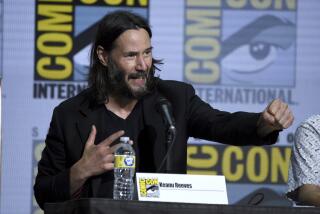A Fast Start to Nowhere : ALONE, <i> By David Small (W. W. Norton: $19.95; 451 pp.)</i>
Start walking on an ingrown toenail and you stab yourself. Earl Dimes, narrator and subject of “Alone,” has a life that is almost entirely ingrown. He starts talking about it, and the blood spurts.
“I was living alone again--had been for nearly a year--when I learned that my kid had set himself on fire,” Dimes begins. He’d been out of touch with the boy. “Mostly you forget about people. They shuttle in and out of your life. . . . Nobody stays around anyway. You get tired of them or they get tired of you. Somebody dies or the family splits up. Friends move away.”
Dimes flies out to the hospital, but the dying boy says nothing, and all the father has to say is: “Apparently he’d been brooding about the circumstances of his life and somehow at 18, it had all seemed so hopeless.”
They are the words of a man tunneled so deep that almost nothing comes to the surface. They are the speech of someone confiding to the drinker on the next bar stool over--the easiest, least demanding, least revealing of confessions. They belong to the hard-boiled, passion-in-a-plain-brown-wrapper school of writing that has come up from Hemingway with innumerable stops along the way.
Those impassive sentences, tamped down like gunpowder, have a momentary explosive power. They are a fast getaway with squealing tires, suggesting some urgent destination. And like so many tire-squealing takeoffs, they are all start--the small-town, Saturday night hot-rod departure. After I’m-outta-here, it’s all riding around past cornfields and malls with no I’m-inta-here at the end.
David Small’s novel is about a man who discovers, in middle age and not quite too late, that the finale of emotional self-sufficiency is lethal solitude. It makes some suggestive points, but it never recovers the energy of its percussive start; it rambles on through a plodding, conventional story, with an engaging side trip here and there, and an unremarkable destination.
Dimes is a would-be writer who struggles for five years to finish a novel and teach at the same time. His book gets a mixed critical reception and no sales. He has strained himself and his marriage to little purpose. He gets a job as a management consultant with an old friend, and travels a lot. For his family, it means replacing the writer’s distance with that of the peripatetic, expense-account professional.
After he has a clumsy one-night affair on the road, his wife leaves him and takes Keefer, their son, with her. There follow years of aimless living, whose solitude is barely breached by a series of casual affairs. Keefer’s death, the death of Dimes’ beloved former father-in-law, and his mother’s progressive decline shake him out of his self-sufficiency. At the end, he gratefully accepts the love of a younger woman, and begins writing again, this time successfully.
Much of the early part of the book is taken up by Dimes’ childhood. His father is a rough, harsh man who drinks and keeps moving his family to pursue a modestly successful business career. His mother, Nola, is depressive until her husband dies; after that she perks up--and perks the book up--as a querulous, crotchety eccentric.
The chapters about his family--Dimes also has an adventurous older brother who is his mother’s favorite but comes to a bad end--are not especially interesting, nor do they have any very persuasive bearing on Dimes’ own story. Things improve with his marriage to Linda, the spoiled daughter of a rich and endlessly indulgent Italian-American businessman. Phil, expansive and bossy, adores his daughter and gives her everything she wants. It makes her marriage shaky--she is always going home to Daddy--but, on the other hand, Phil becomes almost equally fond of his son-in-law, even after the marriage breaks up.
There are some lively scenes involving Phil and his melancholy, patient and perpetually put-upon son Mario. Linda’s ferocity in throwing out her husband after she learns of his infidelity has an appealing spark to it. There is a well-written subplot about the violent feud between Lionel, a black man who is hired into Dimes’ office as a tiny gesture of equal opportunity, and Tammy, who has struggled to rise out of a poor-white background and resents the favors shown to Lionel. Tammy and Lionel are portrayed with a vivacity and complexity that are only in modest supply in other parts of the book.
Dimes’ belated discovery, that life without human commitment is a kind of death, is a perfectly good one. But the other characters--Phil, Linda, Nola and Marilyn, the younger woman he eventually marries--are employed too single-mindedly as his instructors. And Small, who pads Dimes’ story with a good deal of generic material--his string of featureless affairs, an unconvincing account of his efforts as a writer--has not made him remarkable enough to seem worth the lesson.
More to Read
Sign up for our Book Club newsletter
Get the latest news, events and more from the Los Angeles Times Book Club, and help us get L.A. reading and talking.
You may occasionally receive promotional content from the Los Angeles Times.










